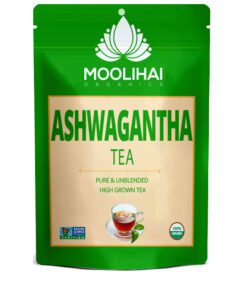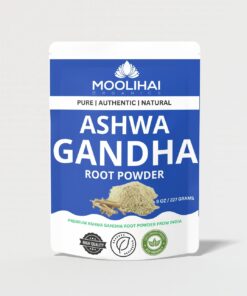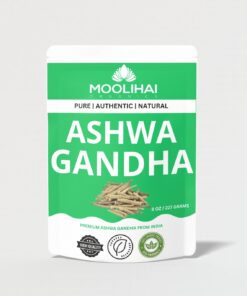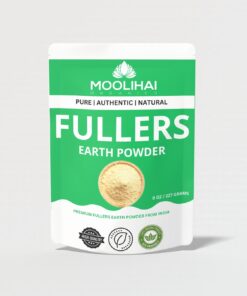Info
7 Science-Backed Benefits of Ashwagandha for Skin
Achieving healthy skin that radiates with natural glow and vitality is truly a blessing. Ashwagandha has been revered for its ability to promote skin health for ages. Let’s explore the benefits of ashwagandha for skin health and its role in addressing various skin concerns.
Ashwagandha, also known as Indian ginseng, is one of the most popular Ayurvedic herbs recognized for its numerous health benefits. Its distinct aroma and taste have made it a staple in traditional medicine, and today, ashwagandha has emerged as a contemporary health supplement, particularly for enhancing immunity and alleviating stress.
When consumed in its powdered form or as a supplement, ashwagandha (Withania somnifera) can profoundly impact both body and mind.
Related: Health Benefits of Ashwagandha
Despite its popularity, many people remain unaware of ashwagandha’s benefits for skin health. Are you among them? Continue reading to discover why ashwagandha is considered a miraculous remedy for skin issues.
How Does Ashwagandha Benefit the Skin?
Ashwagandha is a natural healer that enhances the production of skin oils, moisturizes, and acts as an astringent.
As a time-honored Ayurvedic medicine, ashwagandha has served multiple purposes, including tonic, narcotic, aphrodisiac, diuretic, and stimulant—a versatility that extends to skin and hair health.
Many skin issues, such as acne, breakouts, blackheads, pigmentation, and allergies, are primarily caused by environmental pollutants. These pollutants can trap in skin pores, inhibit oil secretion, prevent the skin from breathing, and lead to cellular damage through oxidative stress.
Studies indicate that high levels of pollution can increase sebum production and lactic acid, disrupting the skin’s natural pH balance.
Adaptogenic herbs like ashwagandha possess exfoliating properties, making them ideal for skin rejuvenation. They help combat various stressors—physical, biological, psychological, and chemical. The bioactive compounds, including withanolides, alkaloids, and saponins found in ashwagandha, deeply penetrate tissues, effectively cleansing the skin.
When ingested or applied topically, ashwagandha’s rejuvenating qualities significantly benefit skin health. Ayurvedic Rasayana herbs, such as ashwagandha, excel in repairing skin, hair, and overall bodily health from the damaging effects of environmental pollution.
Notably, ashwagandha has antioxidant, anti-inflammatory, and hydrating properties that invigorate skin cells. As an adaptogen, it helps regulate collagen production, reduces fine lines, and supports the maintenance of skin’s plumpness and radiance.
Possible Benefits of Ashwagandha for Skin
As an adaptogen, ashwagandha offers remarkable stress relief. Research indicates that stress is a common contributor to loss of natural skin glow, premature wrinkles, and various skin conditions.
Historically, people in Asia have utilized ashwagandha for body and hair washes, as well as for its tonic properties to enhance immunity and relieve stress.
Related: Best Ashwagandha Supplements for Stress and Immunity
Today, ashwagandha is becoming increasingly common as a key ingredient in hair conditioners, shampoos, skin lotions, soaps, and essential oils, all aimed at natural healing.
Let’s dive into the potential benefits of ashwagandha for skin health.
Anti-inflammatory Effects
Ashwagandha possesses potent anti-inflammatory properties that help alleviate skin issues such as pimples, itching, redness, and boils.
Skin infections related to conditions like eczema, psoriasis, scabies, atopic dermatitis, and leucoderma can benefit from ashwagandha’s anti-inflammatory and wound-healing properties, which effectively lower CRP levels in the blood.
Research suggests that ashwagandha can soothe inflammation and prompt tissue regeneration and healing.
Additionally, it effectively treats breakouts and accelerates healing for cuts and bruises.
Combating Oxidative Stress
Ashwagandha is rich in antioxidants, which combat oxidative stress that can lead to skin deterioration.
Keratosis is a severe skin condition characterized by rough, dry patches, dark spots, wrinkles, and under-eye shadows.
The antioxidant properties of ashwagandha help mitigate the effects of oxidative stress. The herb heals the skin affected by keratosis, repairing damage while enhancing firmness and softness.
Oxidative stress not only leads to skin issues but can also contribute to serious health conditions, such as diabetes and cancer. Some studies even suggest it may be linked to male infertility.
Related: Benefits of Ashwagandha for Men
With this understanding, it’s clear why ashwagandha is often termed a versatile herb. Our bodies need antioxidants to effectively counter pathogens affecting our biological and psychological functions. Checkout our ashwagandha capsule.
Managing Excess Oil
While some oil on the skin is necessary, excessive oil secretion can lead to pimples and affect complexion negatively.
To prevent excess oil production, it’s advisable to steer clear of chemical cosmetics and utilize natural remedies like ashwagandha powder or extract.
Ashwagandha cleanses and moisturizes the skin, resulting in an oil-free and hydrated complexion.
Anti-aging Properties
Ashwagandha is classified as a Rasayana, a term used to describe rejuvenating substances that promote youthfulness.
The antioxidants in ashwagandha protect against free radical damage and help delay the signs of aging. If you are concerned about premature graying hair, consuming ashwagandha can aid in reversing it.
Oxidative stress and free radical damage significantly contribute to premature aging, particularly when immunity is compromised.
As an effective immune booster, ashwagandha minimizes cellular damage and promotes healthier skin and hair.
Related: Benefits of Ashwagandha for Hair
Topical application of ashwagandha root powder can improve skin complexion, even out skin tone, soothe irritation, and brighten the skin without leaving impurities.
Collagen, an anti-aging compound present in ashwagandha, is essential for youthful skin both inside and out.
Ashwagandha helps maintain collagen levels, moisture, and oil in the skin, thus delaying the aging process and the emergence of signs such as gray hair, wrinkles, fine lines, and dark circles.
Addressing Skin Pigmentation
Skin pigmentation irregularities occur when there are darker patches on the skin, and hyperpigmentation refers to the overproduction of melanin, which often appears as dark patches on the face. This condition is more prevalent in women than men and can affect any skin type.
The primary cause of hyperpigmentation is aging, which alters melanin levels.
Ashwagandha can assist in regulating melanin levels and treating pigmentation issues. Many Asian women utilize ashwagandha mixed with fuller earth powder to tackle hyperpigmentation and age-related skin problems.
Fighting Acne
Overproduction of sebum contributes to excessive oiliness and impurities, which can lead to acne. Ashwagandha effectively regulates sebum production and minimizes oil accumulation in pores. The withanolides present in the herb are excellent for eliminating dirt and impurities from the skin, offering preventive measures against various forms of acne.
Moreover, its antimicrobial properties assist in controlling acne-related blemishes, inflammation, and discomfort while fostering the healing of acne scars and soothing the skin.
Combating Dehydration
Ashwagandha contains hydrating agents that deeply moisturize the skin. If dry skin is a concern, incorporating ashwagandha can rejuvenate and nourish it. Its moisture properties soothe and calm the skin, aiding in the production of hyaluronan to alleviate dryness and roughness.
How to Use Ashwagandha for Skin?
Ashwagandha root can be consumed both orally and topically for optimal results. This herb is relatively safe and can benefit individuals across the board.
Ashwagandha Face Mask
Incorporate a teaspoon of ashwagandha powder into your face mask for added benefits.
Alternatively, you can create your own face pack using ashwagandha.
For a quick face wash, mix ashwagandha powder with water to form a paste. Gently massage it onto your skin, leave it on for a few minutes, then rinse with clean water.
For a deeper cleanse, combine two teaspoons of ashwagandha powder with one teaspoon of ginger powder, one teaspoon of dried lemon peel powder, and a cup of water.
Mix the ingredients to a liquid consistency, bring to a boil, let cool, and apply to your skin. A few drops of rose water can be added for fragrance. Massage gently and rinse off with cold water.
Tip: After massaging or exfoliating, always use ice cubes or cold water on the treated area to close the pores and prevent dirt from entering the skin.
Ashwagandha Extract and Oil
Ashwagandha oil can also be utilized for skincare. It provides stress relief and enhances cognitive functions.
You can massage ashwagandha essential oil mixed with any carrier oil, such as coconut oil, into your skin and scalp for additional stress relief.
The options above illustrate how to apply ashwagandha powder topically for skin benefits. Additionally, it can be consumed orally.
Ashwagandha Supplements
For anti-aging benefits, mix half a teaspoon of ashwagandha powder with honey and ghee, consuming it twice daily.
In Ayurveda, ashwagandha mixed with milk is referred to as Moon Milk. Combine a teaspoon of ashwagandha powder with a glass of warm milk before bedtime for a calming effect that soothes the nervous system and improves sleep quality.
Alternatively, you can take ashwagandha extract mixed with warm water in the morning to support digestion—which is critical for healthy skin!
The easiest way to incorporate ashwagandha into your daily routine is by enjoying it as tea, renowned for its rich antioxidant, mineral, and plant compound content.
This herbal remedy nourishes the skin from the inside out. While you can’t massage the mind, herbal tea can work its wonders throughout your entire body, including the skin and muscles.
Ashwagandha tea is best enjoyed plain, but you can add lemon, honey, or milk if you prefer a milder taste.
Related: Benefits of Ashwagandha Tea
Possible Side Effects
Currently, no significant adverse effects have been associated with the consumption of ashwagandha. However, it is advisable to take it in moderation, as excessive doses may lead to side effects.
- Headache
- Allergies
- Drowsiness
- Stomach discomfort
- Rapid heartbeat
- Thyroid-related issues
- Low blood pressure
- Low blood sugar levels
Who Should Avoid Taking Ashwagandha
- Pregnant women
- Breastfeeding mothers
- Individuals with thyroid issues
- Diabetic patients
- People with autoimmune diseases
If you are new to herbal supplements or are allergic to Nightshade family plants, it’s best to avoid ashwagandha.
Before starting any new herbal supplement or adding new ingredients to your daily diet, it’s advisable to consult with a healthcare professional.
The Bottom Line
The benefits of ashwagandha for stress and immunity are well-documented and supported by various studies. As such, skin concerns arising from stress and poor immunity can effectively be addressed with this powerful herb.
With promising benefits for skin, hair, and overall health, ashwagandha serves as a potential antidote for many skin issues, helping to prevent their recurrence by bolstering the body’s antioxidants and immune response.
A stress-free mind and body are essential for achieving healthy skin and hair. Ashwagandha, as a rejuvenating herb, certainly aids in this endeavor.








Ponnatharam Stone (Raw) | For Permanent Hair Removal
Vengai Paal | Black Bindi | Dhrishti Pottu | Vengai Pottu for Babies | 100% Natural
Original Edible Camphor | Pacha Karpooram | Bhimseni Camphor
Dried Avaram Senna Flower / Cassia Senna Auriculata / Aavaram Poo / Tarwar / Amaltas Leaves / Senna Auriculata / Avaram Poo / Sanay / Alexandrina / Tanner’s Cassia flower
Natural Dried Moringa Flower – Moringa Oleifera – Drumstick Tree Flower – Murungai Poo – Munagaku Flower
Akasa Garudan Kilangu / Redfruit Creeper / Corallocarpus Epigaeus
Pure Ponnatharam Powder For Hair Removal
Saussurea Obvallata Seeds / Brahmakamal Seeds / Queen of the night / Sacred Saussurea Kon Kapfu / Brahma Kamalam / Nishagandha
Insulin Leaf Powder / Chamaecostus Cuspidatus / Costus Pictus / Spiral Ginger / Insulin Powder / Costus Igneus
Achu Pottu for Babies | Bindi Mould Set | Baby Seratta – 1 Set
Kaunch Beej Powder |Poonaikali | Velvet Bean Powder | Mucuna Pruriens | Kapikacchu | Natural Nervine Tonic & Muscle Builder
Aalam Pazham / Banyan Fruit Powder / Ficus Benghalensis / Marri Palu / Bargad / Dodda Alada Mara / Peraal / Vat Vriksha Powder